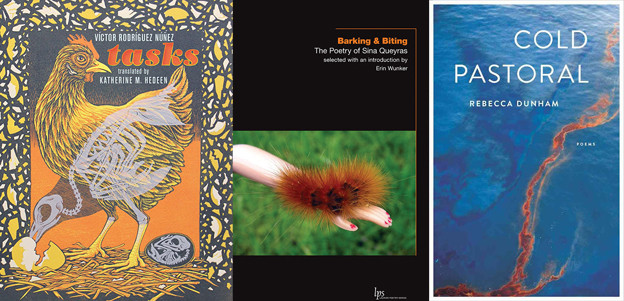
Rootless places: Núñez, Queyras, Dunham
Orchid Tierney

J2 reviews editor and commentator Orchid Tierney writes on three poetry titles from this year and last.
tasks, Víctor Rodríguez Núñez, trans. Katherine M. Hedeen (co-im-press Press, 2016)
Víctor Rodríguez Núñez’s poems chronicle the peripheries of a Cuban homecoming while exploring the porousness of identity and nationalism so marked by a feeling of loss. “[I]dentity lurks,” writes Núñez, “like a forgotten ring in a public bathroom.” These poems are lucid, nomadic but not driftless in local memory as they prowl the geographies of migrant return and exile. Katherine M. Hedeen’s translation further captures the leakages of a selfhood that insists on recovery even as it haunts: “the island is a phantom / rootless word / a leather notebook where nothing’s written / the scenery doesn’t count on you.”
Barking & Biting: The Poetry of Sina Queyras, Sina Queyras, selected with an introduction by Erin Wunker (Wilfrid Laurier University Press, 2016)
“Mud is mud is mud,” writes Queryas, “or the thinking of a poem is the poem.” Barking & Biting trespasses the borders between lyricism and conceptualism, genre and gender, unrepentantly pointing to the textures of anger, grief, and identity in poetry. At stake in this collection is a genealogy of female literary presence and a desire for permeable bodies and genres: “The body is fluid: I am leaking / I no longer care who sees me leak.” Throughout, Queyras’s poems possess language’s desire for likeness and reference without supplanting experience and lyrical reflection. “I am not interested in other words for honey,” she writes; “I am interested in honey.”
Cold Pastoral: Poems, Rebecca Dunham (Minneapolis: Milkweed Editions, 2017)
“Who will document the crisis that bleeds on and on?” asks Rebecca Dunham. Turning to Deepwater Horizon, Flint, and the Joplin tornado among other disasters, Cold Pastoral vividly articulates the persistence and scale of failure and corporate violence unleashed on the environment. These poems complicate the pastoral and elegiac traditions as they interlock human complicity with natural loss, infusing mutual vulnerabilities with catastrophes that exceed language’s ability to represent them: “Like ribbons of kelp, they wash up / bark-black and stretching / as far as the eye can see — boys / sway in the waves, skin sheened / in oil as they toss the tar balls.”